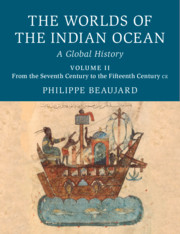Book contents
- The Worlds of the Indian Ocean
- The Worlds of the Indian Ocean
- The Worlds of the Indian Ocean
- Copyright page
- Dedication
- Contents
- Maps and Charts (in Color Plates)
- Illustrations (in Color Plates)
- Figures
- Tables
- Abbreviations
- Part I The Indian Ocean between Tang China and the Muslim Empire (Seventh–Tenth Century)
- Part II Globalization during the Song and Mongol Periods (Tenth–Fourteenth Century), and the Downturn of the Fourteenth Century
- Introduction
- Chapter 7 China: The Golden Age of the Song, the Mongol Conquest, and the Ming Revival
- Chapter 8 India: From the Chola Empire to the Delhi Sultanate
- Chapter 9 Southeast Asia: From the Decline of Srīwijaya to the Rise of Mojopahit
- Chapter 10 Central and Western Asia: From the Seljuk Empire to the Ilkhanids
- Chapter 11 Egypt and Yemen: The Jewish and Kārimī Networks
- Chapter 12 East Africa: The Rise of the Swahili Culture and the Expansion of Islam
- Chapter 13 Madagascar: The Development of Trading Ports and the Interior
- Part III From the Globalization of the Afro-Eurasian Area to the Dawn of European Expansion (Fifteenth and Early Sixteenth Centuries)
- Bibliography
- Index of Geographical Names
- Name Index
- Subject Index
Introduction
from Part II - Globalization during the Song and Mongol Periods (Tenth–Fourteenth Century), and the Downturn of the Fourteenth Century
Published online by Cambridge University Press: 14 October 2019
- The Worlds of the Indian Ocean
- The Worlds of the Indian Ocean
- The Worlds of the Indian Ocean
- Copyright page
- Dedication
- Contents
- Maps and Charts (in Color Plates)
- Illustrations (in Color Plates)
- Figures
- Tables
- Abbreviations
- Part I The Indian Ocean between Tang China and the Muslim Empire (Seventh–Tenth Century)
- Part II Globalization during the Song and Mongol Periods (Tenth–Fourteenth Century), and the Downturn of the Fourteenth Century
- Introduction
- Chapter 7 China: The Golden Age of the Song, the Mongol Conquest, and the Ming Revival
- Chapter 8 India: From the Chola Empire to the Delhi Sultanate
- Chapter 9 Southeast Asia: From the Decline of Srīwijaya to the Rise of Mojopahit
- Chapter 10 Central and Western Asia: From the Seljuk Empire to the Ilkhanids
- Chapter 11 Egypt and Yemen: The Jewish and Kārimī Networks
- Chapter 12 East Africa: The Rise of the Swahili Culture and the Expansion of Islam
- Chapter 13 Madagascar: The Development of Trading Ports and the Interior
- Part III From the Globalization of the Afro-Eurasian Area to the Dawn of European Expansion (Fifteenth and Early Sixteenth Centuries)
- Bibliography
- Index of Geographical Names
- Name Index
- Subject Index
Summary
Along with the creation of a Muslim Empire, the growth of the Chinese economy under the Tang in an outward-looking empire gave impetus to trade throughout the Asian continent and the Indian Ocean, triggering its progressive integration within an Eurasian world-system in which Africa had a part. China would once again act as a locomotive, pulling the carriages of the world-system train much more vigorously than it had before, under the Song dynasty, from the late tenth to the thirteenth century. Generally speaking, expansion in China simultaneously involved agriculture, cities, industry, transportation, trade, and culture, during a period which has often been compared – from an Eurocentric point of view – to the Italian Renaissance. The Song state set up an efficient administration, composed of officials recruited through competitive examinations. Agriculture progressed both in the margins of the empire, thanks to the settling of military colonies, and in the south, with the development of intensive rice cultivation, fostered by higher temperatures and precipitation, and inflows of populations from the north. The Chinese population more than doubled between 800 and 1200.
- Type
- Chapter
- Information
- The Worlds of the Indian OceanA Global History, pp. 147 - 177Publisher: Cambridge University PressPrint publication year: 2019



